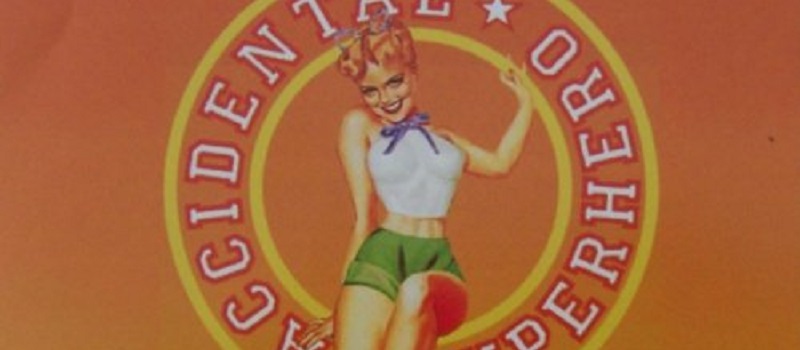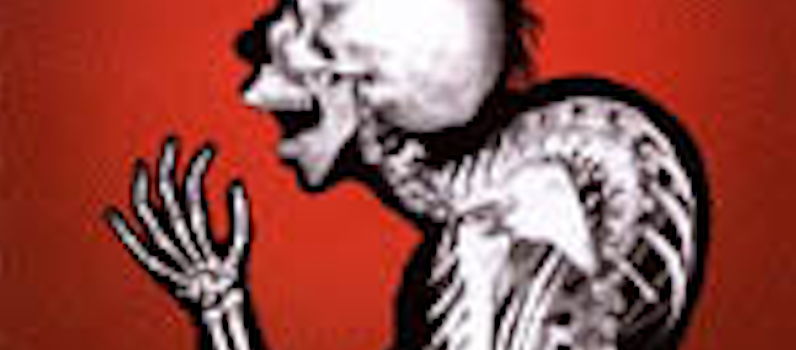It’s 2003 all over again, and no, no, please exhale—I’m not talking about any kind of reprise of the Bush years. The Brooklyn-based “antique-garde” ensemble Piñataland is at it again—self-releasing their third full-length CD, Hymns for the Dreadful Night—and the new record, all 10 tracks, is a true return to form, recapturing the magic and Old World wonder of the group’s epic Songs for the Forgotten Future Vol. 1, which first hit the streets eight years ago.
The record starts with the melancholy introduction “The Dreadful Night,” where Doug Stone and Robin Aigner, an accomplished solo musician in her own right, sing in near-whispers over a somber, reverb-heavy piano. Explorations of sadness, however, are not this record’s primary concern, and it’s not long before the band—on this record, an octet—are stomping over gypsy violins on “An American Man” or rollicking to “Island of Godless Men,” a tune driven by thumping floor toms and featuring a rousing closing breakdown that will shake the barroom’s rafters.
Here and elsewhere, Piñataland is best when they inject their combination of Old World sounds and New World moral crises with touches of theatricality and drama. On “The Death of Silas Deane,” vocalists Doug Stone and Aigner playfully coo and croon over shuffling acoustic guitar, country-and-western bass, and Deni Bonet’s almost operatic strings, building to a climax where Stone wails, “So let the jackals howl for blood / As the traitor takes the stand / Let my reputation crawl through the mud / Of this unforgiving land.” Piñataland’s lyrics and melodies are the kind you find yourself humming days after you last heard the disc.
Bonet’s emotive violin takes center stage on “The Oldest Band In Town,” swinging and swooning as Dave Hofstra enters with the song’s bass measures played out in perfect time on a tuba, something more reminiscent of Songs for the Forgotten Future Vol. 1 than its slightly more modern sequel. Gerald Menke’s pedal steel, again a perfect touch, is the focal point of “Hiawatha,” an addictive, if straightforward, country tune that hits all the right notes and then some.
Menke’s pedal steel and Dobro work are effective tools in Piñataland ’s eclectic songwriting canon and, like so many of the record’s finer details, bolster the group’s Old Time reputation. But superficial appearances to the contrary, the band seems to observe the genre from afar, like archivists, borrowing its more resonant or relevant elements and telling stories from the unrecognized past while keeping the compositions rooted in a very modern kind of indie folk-rock. They sing stories whose themes could have been taken off an old 78, but their musical phrasings, lyrical mannerisms, and even points of reference, are nothing if not contemporary.
Take the album-closing “Cemetery Mink.” “Underneath this country there’s a labyrinth of dirt,” Stone sings, “A hundred highways connecting all this murk.” Then Aigner joins in harmony: “Found an ivory smile carved from hippopotamus / Held together with springs of gold and rust.” Though “Cemetery Mink” seems to borrow from the genre, these are not the lyrics of a traditional country ballad. And when everything falls into place during the chorus, the mix is, again, decidedly modern, with male and female vocals working in harmony, piano and spirited electric bass spiraling away, and support on display from understated drums and violin. Old Time music is nowhere near as unsophisticated as its usual depictions in mainstream media would suggest, but Piñataland is concerned, both musically and thematically, with the problems and implications of modern-day life.
Sometimes, though, moral dilemmas of contemporary life aside, the band is just as good at crafting a soulful acoustic ballad. After an emotive a capella introduction, “Oppie Struck a Match” unfurls into one of the more radio-friendly songs on Hymns for the Dreadful Night, complete with all the record’s best features—Ross Bonadonna’s and Menke’s emotive guitars, Bill Gerstel’s driving percussion, and, above all, Stone and Aigner singing in harmony as they walk through the catchy chorus: “And we’ll all fall to our knees when the thunder cracks far and wide / Like the calling of the master from the other side!”
Piñataland has grown beyond its “Forgotten Futures”—sad for those of us who longed for those records—and Hymns for the Dreadful Night is proof that, whatever musical paths they choose to take next, the group’s members are just as invigorated as ever to carve out their space as chroniclers of lost eras playing music that bonds the new with the old. – The Brooklyn Rail, July/August 2011
-30-




